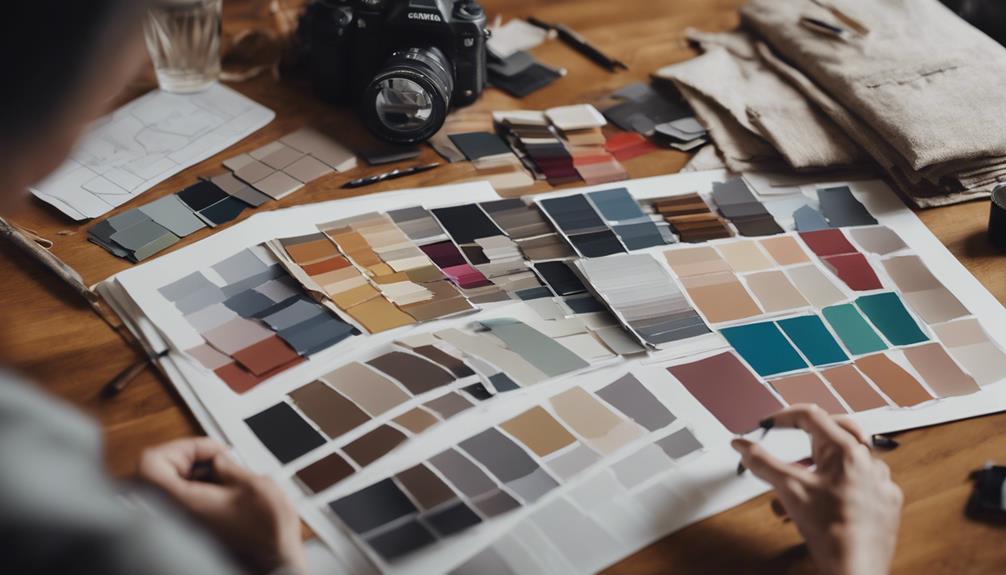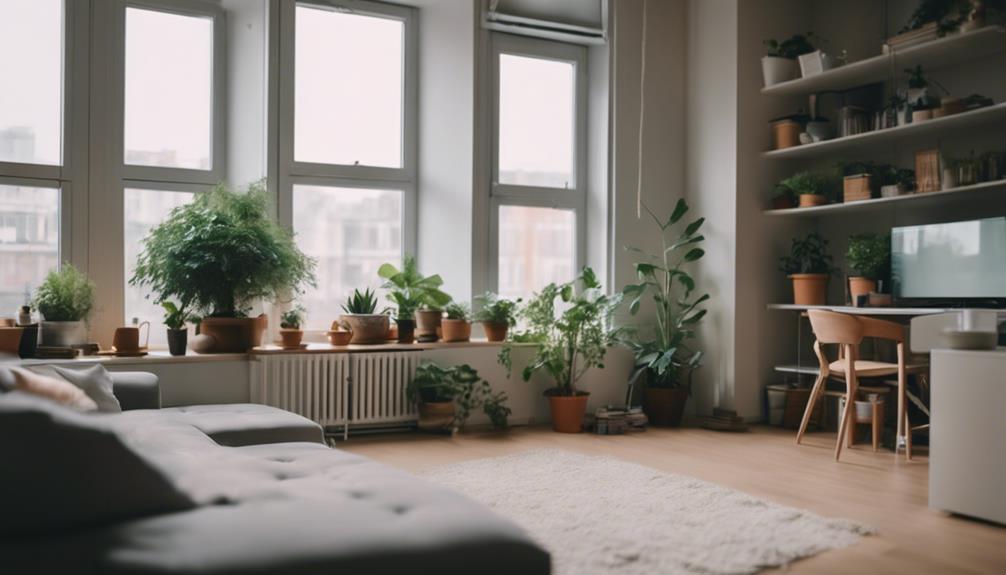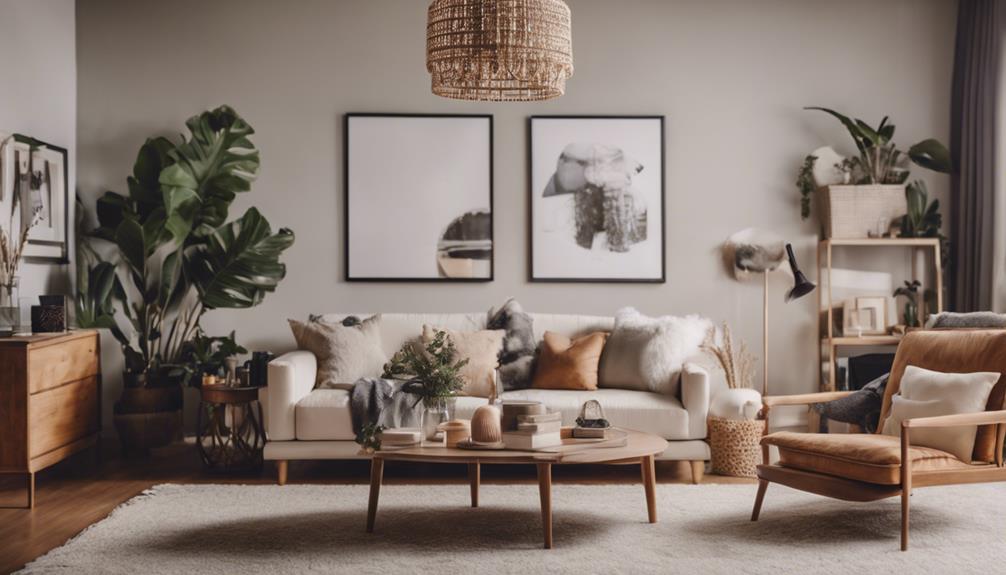Are you interested in transitioning to the home decor industry? It is recommended to prioritize practical experience and a strong portfolio over formal credentials. Your success in home decor depends on effectively showcasing your design skills. Look for companies that share your values and vision to boost your career growth. Building a strong set of skills through ongoing learning is essential for success in this competitive field. Keep in mind that experience often carries more weight than certifications in the home decor business. Mastering design software and gaining real-world experience will facilitate your transition. Are you eager to learn more about breaking into the home decor industry?
Key Takeaways
- Consider freelance interior design for faster success.
- Prioritize practical experience over formal credentials.
- Align with firms that match your values and vision.
- Develop a strong skill set through continuous learning.
- Pursue a diploma and build a diverse portfolio.
Career Change Essentials
If you're considering a career change into the home decor business, understanding the key factors driving this decision is essential. The allure of interior design and creating beautiful spaces may be what draws you to this field. Additionally, the potential for creativity and the opportunity to work with a variety of clients can be appealing. However, it’s important to also carefully consider the business side of things. Researching home decor business tips, understanding market trends, and building a network of suppliers and contacts are all crucial components for success in this industry.
With the average American undergoing 5-7 career changes in their lifetime, it's not uncommon to pivot towards a more creative and fulfilling path like design #career. Around 30% of the workforce switches careers annually, seeking satisfaction, better work environments, and realignment of values.
In the U.S., reaching a senior partner position can take up to 15 years, highlighting the slow progression in traditional industries. While the average salary in the U.S. stands at $51,168, it drops to $35,000 in service industries, motivating individuals to explore new avenues.
Embracing a career change into interior design can offer you the opportunity to unleash your creativity and pursue a passion for design in a dynamic industry.
Certification Vs. Experience

When deciding between certification and experience in the home decor business, remember that practical experience often holds more weight than formal credentials.
While certifications can provide a foundation of knowledge, real-world experience and a strong portfolio are key in showcasing your design skills.
Prioritize skill development and hands-on experience to excel in the interior design industry.
Value of Experience
Experience holds greater importance than certification in the interior design industry, emphasizing the significance of practical skills and a strong portfolio. Successful interior designers have demonstrated that building a robust skill set through hands-on experience and continuous learning is more valuable than relying solely on certification programs.
In this industry, talent, skill, and experience are valued over pedigree from certification programs. Design firms searching for top talent prioritize practical experience, real-world projects, and a diverse portfolio when hiring.
While certification can provide a foundation, self-taught skills, a strong portfolio of your work, and relevant experience are essential for excelling in the competitive interior design field. Hence, focusing on honing your skills, gaining practical experience, and showcasing your work through a compelling portfolio can greatly enhance your prospects in the home decor business.
Impact of Certification
Certification in interior design may not hold as much weight as practical experience and a strong portfolio in the home decor industry. While certification can provide a foundational understanding of interior design principles, the industry often values hands-on experience and a diverse portfolio over formal credentials.
In fact, many successful interior designers have risen to prominence without formal training or certification, emphasizing the importance of practical skills and creativity in this field. When seeking opportunities in interior design firms or pursuing a career in interior design, showcasing your practical experience and previous projects can have a profound impact on your chances of success.
In the competitive world of interior design, clients and employers often prioritize individuals who can demonstrate their capabilities through tangible results. Thus, focusing on skill development and continuously honing your craft can be more beneficial than solely relying on formal certification.
Skill Development Importance
Developing a strong skill set through practical experience is crucial for success in the interior design field, often outweighing the importance of formal certification. In the world of interior design, hands-on experience and a continuously evolving skill set play a significant role in establishing a prosperous career. While certifications can provide foundational knowledge, the true essence of design expertise lies in honing practical skills and building an outstanding portfolio. Here is a comparison between certification and experience in skill development within the interior design field:
| Certification | Experience |
|---|---|
| Provides theoretical knowledge | Offers practical insights |
| May not always align with industry trends | Adaptable to current design demands |
| Shows commitment to learning | Demonstrates real-world problem-solving |
| Recognized by some clients | Portfolio speaks for itself |
In the field of interior design, actively developing and refining your skills through experience often holds more weight than formal certification. Prioritize hands-on learning and building a strong portfolio to stand out in the competitive design industry.
Finding the Right Firm

When searching for the right firm in the home decor business, assess their alignment with your values and vision. Evaluate how you can contribute importance and enhance the firm with your unique skills.
Choosing a firm where you can truly thrive creatively and professionally is crucial for long-term success in the industry.
Firm Alignment Assessment
Evaluating the alignment of design firms is vital when entering the home decor business to secure a match with your values and career goals.
When considering a change in career, it's crucial to assess how well a potential firm aligns with your design style, values, and professional aspirations. Look for firms where your skills can flourish and where your contributions as a project manager are valued.
Avoid companies that don't resonate with your vision or where you feel your creativity may be stifled. Seek out design firms that offer a supportive and creative environment conducive to your growth.
Contributing Value Evaluation
Assess design firms based on their alignment with your values, vision, and potential contributions to the industry to find the right fit for your career in home decor.
When evaluating design firms during your career change, consider how their values and vision align with yours. Look into the type of projects they undertake and their client base to determine if you'd fit well within the organization.
Seek out firms where you can confidently thrive and leverage your design skills to make a meaningful impact in the industry. It's essential to avoid firms that contradict your vision and career goals to guarantee a fulfilling progression.
Choose design firms that resonate with your design style and values, creating an environment conducive to your professional growth. By finding a firm that aligns with your vision, you can contribute positively to the industry and establish a successful career in home decor.
Skill Development Importance

Developing a strong skill set in interior design is vital for success in the home decor business. While talent is valuable, it isn't always adequate to thrive in the competitive industry. Building a robust design skill set requires dedication, hard work, and a commitment to continuous learning.
Although formal certification can be beneficial, many successful interior designers have excelled without it, emphasizing the importance of self-taught skills and a strong portfolio. In the design field, practical experience often holds more weight than formal training. Continuous improvement in skills is essential for both employees and aspiring entrepreneurs looking to break into the interior design market.
Subscription and Revenue Tips

To stay current in the home decor industry and maximize revenue opportunities, consider subscribing to industry updates and revenue tips from sources like Design Daily and BOH. These platforms offer in-depth analysis and insights into the latest trends in the home decor business. By accessing digital magazine content and staying informed on industry developments, you can enhance your knowledge and make informed decisions to grow your business.
In addition to staying updated, take advantage of revenue sharing opportunities through affiliate links. This strategy supports content creation while also generating income for your business. By strategically incorporating affiliate links into your content, you can monetize your platform and increase revenue streams.
Furthermore, staying connected with industry insights and revenue strategies is vital for enhancing your presence in the home decor market. Navigate through newsletters, contact information, and site FAQs to find additional resources that can help you stay informed and ahead of the competition.
Embrace these tips to boost your revenue and succeed in the home decor business.
Changing Career Facts

Experiencing an average of 5-7 career changes in your working life is a common occurrence in the United States. Around 30% of the workforce changes careers every 12 months, often due to frustration, poor work environments, or realignment of values.
If you're contemplating a shift from your corporate job to becoming a freelance interior designer, these statistics may provide some reassurance. In the US, it typically takes about 15 years to reach a senior partner position in a firm, but by shifting to a freelance career, you can accelerate your path to success in the home decor industry.
Moreover, the average salary in the US stands at $51,168, although service industries witness a decline to $35,000. As you plan your future in home decor, consider how this change might impact your income and career trajectory.
Embracing change opens up a world of possibilities, and venturing into a creative field like freelance interior design could lead to a fulfilling and prosperous future.
Interior Design Transition Tips

Consider pursuing a diploma in interior design to acquire the foundational skills necessary for a successful shift into the field.
Learning design software tools and honing your drawing skills are vital aspects of transitioning into interior design.
Many American universities now offer distance learning courses tailored for career changers entering this creative field, providing flexibility and accessibility.
To make a smooth transition and succeed as an interior designer, focus on the following tips:
- Build a Strong Portfolio: Showcase your design projects, even if they're personal or pro bono, to demonstrate your skills and style.
- Gain Real-World Experience: Internships or volunteer work can provide valuable hands-on experience and help you understand the industry better.
- Develop Industry Relationships: Networking with professionals in the field can open up opportunities, mentorship, and collaborations that can propel your career forward.
What are the key steps to successfully transitioning into the home decor business and thriving?
Transitioning into the home decor business can be exciting and challenging. Key steps include conducting market research, identifying a niche, creating a unique brand, building a strong online presence, and providing exceptional customer service. By following these steps, you can learn how to thrive in home decor and build a successful business. Utilizing social media platforms and partnering with influencers can also help to increase brand awareness and drive sales. Additionally, staying up to date with the latest trends and constantly seeking customer feedback can provide valuable insight for growing and evolving your business. These home decor business tips can help you stay ahead of the competition and achieve long-term success in the industry.
Conclusion
So, are you ready to make the leap into the home decor business? Remember, according to a recent survey, 82% of people feel that their living space greatly impacts their overall well-being.
By pursuing a career in interior design, you have the opportunity to not only transform spaces but also positively impact the lives of others.
Don't hesitate to follow your passion and start creating beautiful, functional spaces for clients today!









